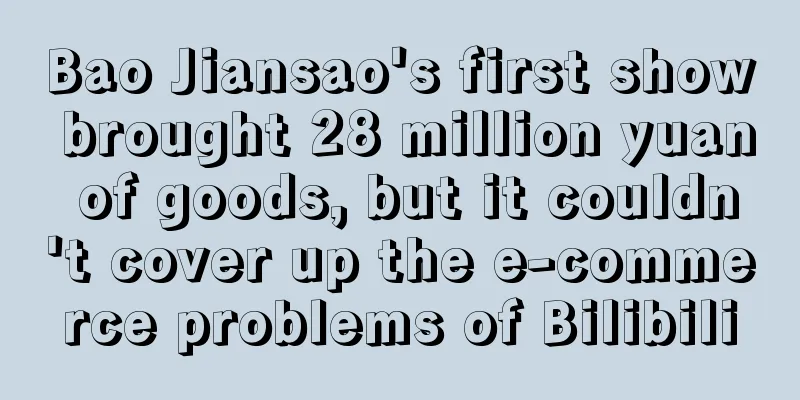Young people can no longer take advantage of discount stores

Tian Yu was a little depressed when she was shopping at Hi-Special. She bought a box of facial masks and two bottles of orange juice, but found that she had to pay 4 yuan more when checking out. The reason was that the store divided the price into the original price and the non-member price. If she applied for a 99 yuan membership card, she could enjoy a lower member price. She was confused about this. "I came to the discount store to get the bargains. Why should I pay for membership to enjoy the low prices?" Coincidentally, on Xiaohongshu, there are many complaints about "Hi-Special Discount Store Members". In the past two years, discount stores have blossomed everywhere. Discount stores represented by "Hi-Special" have become a "paradise" for young people to get bargains by selling expired products, tail goods, out-of-season goods and slightly defective products that are regularly cleared by brands or manufacturers. Evian water at 1.8 yuan per bottle, Yuanqi Forest at 2.8 yuan, facial masks at half price... this generation of young people buy products of different brands at "bargain prices" in the store. In the retail industry, paid membership has always been an important means to effectively lock in users and increase customer stickiness. Nowadays, in discount stores like Hi-Tec, some users are repelled and dissatisfied, and even shout that they can't get the free stuff. In fact, behind the membership system, from tearing off expiring labels to adding private brands, the discount store ecosystem that has emerged during the epidemic is undergoing dramatic changes. 1. 99 yuan membership, young people who visit discount stores are not buying itWhen Tian Yu checked out, her shopping pleasure was swept away. After the clerk reminded her, she realized that the member price was displayed in the largest font on the black background on the product label, and the dealer suggested retail price and non-member price were displayed in smaller fonts on the left and right sides. On Xiaohongshu, bloggers with similar experiences as Tian Yu also complained about Hi-Go's membership card. Their complaints were mainly focused on two aspects: the font size of the non-member price was too small and easy to be overlooked, and the 99-yuan membership card was not a stored-value card. The membership cards displayed at Hi-Tech Shopping stores show that users who apply for a 99 membership card can enjoy four types of benefits: an instant discount of 50 yuan for purchases of 100 yuan or more on the same day, an instant discount of 30 yuan for purchases of 100 yuan or more on the next day, and a coupon for a 10 yuan discount for purchases of 50 yuan or more will be given every week. Despite the multiple card coupons and discounts, and the monthly membership day, Tian Yu still couldn't accept it. "My feeling is that you have to spend money to get discounts. It might as well be called a member discount store." A Hi-Go store owner said that currently 70% of the products in the store are sold at member prices, mainly to lock in old customers and increase repeat purchases. The member price tag was introduced this year because many users could not intuitively understand the "black gold price" used in the past. In addition to Hi-Special, "Discount Cow" is currently offering a membership stored value card model. The stored value of its membership cards ranges from 100 yuan to 1,000 yuan. A "Discount Cow" shop owner said that if the total purchase amount is less than the balance, you can enjoy the membership price, that is, if the stored value is 100 yuan, the daily consumption must be less than 100 yuan. The shop owner also emphasized, "Our membership is relatively simple, there is no routine, just store value consumption." At present, the membership model of other discount stores has not caused controversy on social platforms. Like "Hi Special Shopping", "Hao Special Shopping", which is positioned in first- and second-tier cities, is more similar to the Miniso model in terms of membership system construction. A store owner introduced that users can become members by following the "Hao Special Shopping" applet and enjoy the right to receive free shopping bags. On the weekly membership day, members can enjoy random discounts. Public information shows that the Hi-Special Purchase membership card was launched during the Spring Festival of 2022. On the Black Cat Complaint Platform, searching for "Hi-Special Purchase" also found that user complaints focused on a series of issues such as membership card routines and difficulty in refunding. To a certain extent, young people go on a shopping spree in discount stores with the hope of "making a profit as soon as you buy". Although the price difference between member and non-member prices for most products in the store is only about 1 to 2 yuan, and the price difference for some facial mask products is about 6 to 10 yuan, it also "hurts" their desire to get a bargain. User data disclosed by Hi-Tech Shopping in the past shows that the purchasing population of those born after 2000 has reached more than 20%. Most of Hi-Tech Shopping's users are women aged 18-35. The average customer unit price is 48 yuan, corresponding to the purchase of 8-9 items. Hi-Tech Shopping users visit the store 1-2 times a month on average. Zhang Qiang, founder of Hi-Tec, once said that the shopping mentality of users who come to discount stores is to buy entertainment. "Products that cost 8 yuan in other places are 4 yuan here, just like going to an outlet. After buying, you get a bargain." Cai Jingzhong, partner of Wujie Innovation Capital, believes that since the supply of soft discount stores is not stable, it is difficult for consumers to form a stable product structure in the store, and the user loyalty is low. In addition, discount stores such as Hi-Tec are mainly snacks. In contrast, in life discount stores such as grains, oils, rice and noodles, consumers may be more receptive to membership because the purchase can basically be recovered after one purchase. Not only the members are controversial, but users who visit the stores near the expiration date have found that the pleasure of getting bargains is decreasing. As a senior enthusiast of discount stores, Wang Qi said that many products in the store are actually imitations of popular bestsellers. Behind them are the products of "Hao Te Mai" produced in cooperation with suppliers, but the prices are lower. Tech Planet visited several Hi-Go and Hao-Temple stores, and their staff all said that there were almost no products nearing expiration in the stores. The "traffic diversion" products of the two stores were also different. In Hi-Go stores, samples of various big brands and beauty products were placed at the door, while toys and blind boxes were placed at the door of Hao-Temple. 2. Times are tough, and discount stores seeking changeHi-Specials and Hao-Specials are representatives of soft discount stores, which mainly sell low-priced genuine products through various tail goods channels, such as TJX in the United States and Don Quijote in Japan. Hard discount stores, on the other hand, select limited items, increase their own brands, improve operational efficiency, and achieve the ultimate cost-effectiveness of goods, such as Sam's Club, Costco, and ALDI. In the past year, "Hi-Special" stores have not had a good time. The Hi-Special stores located in Beijing World Trade Center and Chaoyang Joy City are all closed. In September last year, Haotemai and Hi-Special announced that they would open up for franchising. Data from Zhaimen Canyan shows that, as of now, there are 136 Hi-Special Purchase stores still in operation, 9 stores have suspended operations, and there are 499 Haotemai stores still in operation, 9 stores have suspended operations. A Hi-Go recruiter said that they would test stores in many shopping malls in the early stage, and there would be rent discounts during the epidemic. If they cannot cover the costs now, they will definitely close them in time. He believes that one of the benefits of opening up franchises now is that the purchase volume will increase and the purchase cost will decrease. "The company has also revealed that if all strategies go well, there may be plans to go public." For "Hi-Specials", they were once the beneficiaries of the market dividend. Since the outbreak of the epidemic, the logistics turnover of goods and the operation of physical stores have been hindered, and a large number of goods have been piled up in warehouses and stores. The increase in the number of unsalable goods has given more room for the development of the near-expiry business. The endless supply of products that are about to expire are the store's "golden signboard", such as Yuanqi Forest sparkling water at 1 yuan a bottle, Baichun biscuits at 2 yuan a box, and Zhong Xue Gao at 7 yuan a stick... These products are nearing their expiration date but are sold at very cheap prices, and they precisely hit the psychology of young people who want to save money. Shanghai Securities' 2022 discount retail research report shows that the market size of near-expiry products grew rapidly to 31.8 billion yuan in 2020, and is expected to exceed 40 billion yuan in 2025. Near-expiry stores once became a hot track in the venture capital circle. Brand discount stores such as Hi-Special and Hao-Special also thrived with the help of capital. Hema, Renrenle, Jiajiayue, Suning and other supermarkets also entered the discount store market, hoping to get a piece of the pie. In fact, near-expiry products are just one of the tail products. Other categories such as loss products and non-hot-selling products of big brands are constantly entering the shelves of discount stores. They can grab users by offering prices 30%-50% lower than those of supermarkets and convenience stores. Moreover, many slow-selling brands of new consumer brands are also one of the sources of products approaching their expiration dates. Therefore, discount stores approaching their expiration dates are known as “brand graveyards”. However, with the increase in the number of players, the supply of goods is limited and it is difficult to find tail goods. A discount store founder said that tail goods are goods obtained through various opportunistic purchases and are very unstable. For example, in advertising companies this year, there will be many advertisers who will replace the products, but they will be gone next year. In the second stage of development, they have reduced the number of near-expiry products, keeping them at around 20%-30%, and only use them as "traffic diversion products", and instead sell low-priced, high-profit beauty products, daily chemicals, trendy toys, and other products to gain profits. A supplier said that imported products, domestic trends, and Internet celebrity foods are quite popular in discount stores, satisfying the "new, strange, and unique" psychology of young people. Now, in the third stage, discount stores that are about to expire have begun to establish their own brands. Tianyancha shows that Shanghai Xinguo Supply Chain Co., Ltd., to which Haotemai belongs, has applied for the "Xiaqu" trademark. Beijing Youpin Kumai Technology Co., Ltd., to which Hi-Tego belongs, has currently registered several food and daily chemical trademarks such as "Qiang Xiaolu", "Mutou Qiqi", "KASUREOO", "Yikule", "Chubensheng", and "Xiaoshi Wanxiang". Hi-Tech will "imitate" its own products. For example, Hi-Tech's Qiang Xiaolu is extremely similar to the popular online product Wang Xiaolu in terms of packaging and products. On Hi-Tech's shelves, Qiang Xiaolu will be placed together with Wang Xiaolu to "make it look real", and attract users to buy at a lower price. A Hi-Go discount store business recruiter revealed that if some big-name products cannot be purchased at a low price, the company will choose to create its own brand of the same type. For example, if Watsons' dental floss sticks cannot be obtained, the company will cooperate with manufacturers to produce similar dental floss products. 3. Is discount store still a good business?Unstable supply is still the "Sword of Damocles" hanging over the heads of soft discount stores. After all, the better the sales of regular-priced goods, the less supply there is. With the easing of the epidemic, efficient logistics and improved inventory turnover have further reduced the number of unsold goods. The industry has also seen a preliminary reshuffle. In the past year, brands that mainly sold near-expiry products, including Boom Boom Mart and Bengong Snacks, have collapsed one after another. Wang Lei, a consumer investor, believes that with the complex distribution system in China and the extremely dispersed supply of expiring products, it is difficult for any soft discount store brand to monopolize the supply and reduce procurement costs like foreign soft discount brands. Moreover, the entry threshold of expiring discount stores is low, which will result in a situation where there are too many people and too little supply. In addition, he believes that in the past, Hi Specials and Hao Specials stores were mainly located in shopping malls in first- and second-tier cities, where users had more "first-hand" experiences. In addition to near-expiry products, if a hit product cannot be created, the user repurchase rate will be low. "So far, there has not been a scale of 800 stores in the domestic soft discount stores, nor has a good single-store model been created." On the other side of the coin, hard discount stores are experiencing a boom. They are focusing on the lower-tier markets and opening stores intensively. Some brands have even opened more than a thousand stores in a year. Brands represented by Otto, Youming Snacks, and Zhao Yiming Snacks continue to gain favor from investors. Cai Jingzhong, partner of Wujie Innovation Capital, believes that purchasing at soft discount stores is more like "shopping" in the market. In many cases, it is based on "opportunistic purchasing" to find end-of-life products, and the large purchasing team also increases costs. The advantage of hard discount stores is that the supply chain is more stable. The core is actually to cooperate with factories to find products that "make customers scream". Cai Jingzhong analyzed that the hard discount stores are based on low-cost operations, refined management, and efficient supply chains. Brands need to have a high ability to understand user needs. "You need to see what consumers like, lead the trend, and develop it so that others can't imitate it." At present, with the construction of their own brands, Haotemai and Hi-Tego are a combination of "soft discount + hard discount" and are also undergoing continuous transformation. An employee of Hi-Tego said that the company plans to add some headwear, earrings, necklaces and other products to increase the stickiness of female users and increase gross profit. According to several Hi-Tego employees, Hi-Tego's gross profit is currently around 30%. Wang Lei said that currently domestic soft discount stores are facing many challenges and are still in the process of "trial and error" and transformation exploration. Whether they can eventually become the Chinese version of "Don Quixote" is a great test for the founding team. He is more optimistic about the market development of hard discount stores. He estimates that there are nearly 40,000 hard discount snack mass-market stores in the country. (Note: Tian Yu, Wang Qi and Wang Lei are pseudonyms in this article) Author: Lin Jing Source public account: Tech Planet (ID: tech618); focusing on cutting-edge Internet technology and new business. |
>>: The basis of Douyin's sales is diligence
Recommend
What to do if Amazon Cloud network access is unstable? Which cloud server address should I choose?
Amazon Cloud Services provides a variety of powerf...
Can Amazon shipping fees be set differently? How to calculate the cost?
We all know that when you send express mail, the c...
PR enters the era of user operation
Today, public relations information is always ques...
Is it legal for cross-border e-commerce to import and sell domestically? Which one has higher profits, domestic sales or foreign sales?
With the development of globalization, cross-borde...
This is the business analysis report of a large company, not a "PowerPoint reading meeting"
In business analysis, how to extract key informati...
What is a good Amazon order conversion rate? How to calculate it?
There are still many merchants opening stores on t...
Alibaba International Station Updates Privacy Policy
In order to better protect the legitimate rights a...
Zhuang Jun: Xiaohongshu sold 4 million bath oils, the key is to do these 6 things well
The emotional body care brand successfully found p...
100,000+ exposures in 5 days! I use Douyin to attract customers for traditional enterprises, and the commission in a single month is over 80,000!
It is becoming increasingly difficult for enterpri...
6 recent favorite cases
This article mainly introduces six brand cases tha...
What are the consequences of abandoning an eBay bid? Can I choose not to buy after successfully negotiating a price?
There are still many buyers who bid on eBay. Altho...
10,000-word analysis | How to achieve global conversion through people-oriented marketing on Xiaohongshu
How can brands conduct people-oriented marketing o...
What should I do if my Shopee store is frozen? What are the common types?
Shopee sellers need to understand what is account ...
How do I set up Chinese on Shopbop? What are the overseas direct purchase platforms?
When using Shopbop, people usually set it to Chine...
Dong Yuhui is the "spiritual successor" to Yu Minhong
The transformation of Oriental Selection and Dong ...









